Salicylic Acid Shampoo – What Is It, Benefits, And How To Use It
Take a deeper look into the perks and risks of this hair care product before using it.

Image: Shutterstock
The best salicylic acid shampoos can help manage dry, itchy scalp. Salicylic acid is a beta hydroxy acidi An exfoliant that penetrates through the deeper layers of the skin, treating scars, fine wrinkles, acne, hyperpigmentation, melasma, and other skin complexities. known for its skin exfoliating properties. It is best for managing dandruff and oily hair and also helps manage skin conditions like seborrheic dermatitisi A skin condition that affects the oily areas of the body, such as the scalp and causes dandruff, scaly patches and inflamed skin. of the scalp. Its comedolytic propertiesi Properties that inhibit comedones and help treat acne that appear as pimples and spots on face, back and chest. are used to deal with freckles, acne vulgarisi Having acne issues due to extra oily skin, resulting in blackhead, whiteheads and frequent breakouts on the face, chest and back. , photodamagei In this condition, the skin is affected by prolonged exposure to sunlight, leading to dark patches, wrinkles and sunburns. , and melasmai An acquired skin disorder related to hyperpigmentation and increased sensitivity of the skin as a result of prolonged and direct sun exposure, and sometimes, hormonal changes. (1).

It is always advised to consult a doctor before using a salicylic acid shampoo. Even though they are safe to use, unregulated overuse may cause side effects. Keep reading to learn more about salicylic acid shampoos and their benefits for your scalp and hair.
In This Article
Benefits Of A Salicylic Acid Shampoo
Salicylic acid (SA) is a keratolytici The property of a substance to dilate or dissolve the keratin or the outer layer of the skin, allowing the surface to absorb moisture, thereby treating dry, scaly and itchy skin or scalp. (exfoliating) and desmolytici Relating to an agent with gentle exfoliating properties that help shed dead skin cells and reduce scalp problems and flakiness. agent.
Meaning, it disrupts the connective tissues in the skin and promotes shedding (1). This property of salicylic acid makes it beneficial for multiple issues. Some of them include:
1. Dandruff Management

This itchy and flaky scalp condition is caused by the abundance of Malasseziai A type of fungus that thrives on oils and fatty acids from the skin and the scalp, often causing various skin disorders including Seborrheic dermatitis and dandruff. , a type of fungus. Salicylic acid is often used to get rid of dandruff (2). It helps in scalp exfoliation by dissolving the flakes, making them easy to be washed off. This minimizes itching and irritation.
 Trivia
Trivia2. Seborrheic Dermatitis
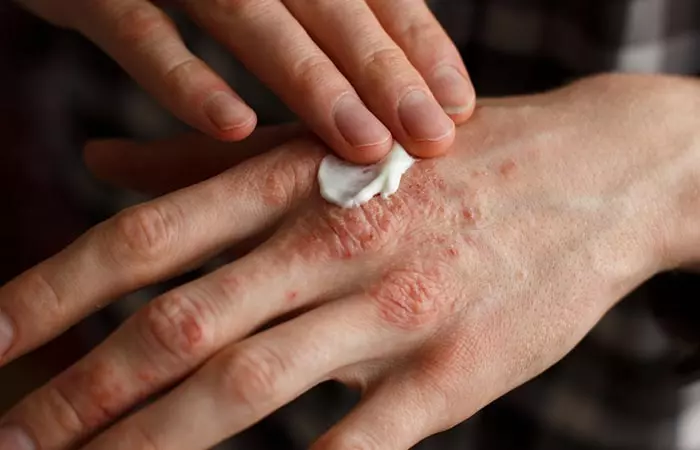
Seborrheic dermatitis (known as dandruff when it occurs on the scalp) on the body is a condition marked by flaky, itchy skin and oily skin patches. Salicylic acid helps manage the condition by dissolving the skin patches and flakiness.
3. Scalp Psoriasis
Psoriasisi A skin condition when the skin in the knees, or on the elbows and scalp turn dry and itchy. It could be inflamed and very painful. is a chronic inflammatory condition affecting any body part, including the scalp.
It is caused by excess cell turnover on the skin, causing itchy, scaly, and red patches. Salicyclic acid can manage the psoriatic plaquesi A type of psoriasis causing plaques on the skin that are dry, thick, scaly and could be red, silvery-white or dark in color. , minimizing itchiness (3).
If you have scalp psoriasis, using salicylic acid shampoos can help manage the flare-ups. However, salicylic acid does not treat psoriasis. You have to use medicated products and take prescription medicines to minimize it.
In an epidemiological study on psoriasis in hard-to-treat body locations, 4016 adults under the age of 18 years from a Danish Skin Cohort were studied. The most frequent of the hard-to-treat locations was found in those with scalp psoriasis, with an incidence rate of 43%.
Scalp issues often affect the overall scalp health and may trigger hair loss. Now, the question is, does salicylic acid minimize hair loss? Find out in the next section.
Key Takeaways
- Salicylic acid can help treat seborrheic dermatitis as it reduces flakiness and scalp patches.
- It is popular for treating dryness and itchiness in the scalp, preventing dandruff.
- It supports scalp health, which in turn can curb hair loss.
- Salicylic acid may cause peeling and skin irritation in some individuals so it is advisable to consult with a doctor.
Can Salicylic Acid Combat Hair Loss?

No. Salicylic acid does not treat hair loss. However, it can help manage and minimize a variety of issues affecting your scalp health. This may help minimize itchiness and your urge to scratch your scalp and reduce the chances of hair loss.
While there are plenty of salicylic acid shampoos available in the market, how about trying a homemade recipe? Keep reading to learn more.
DIY Salicylic Acid Shampoo
You can make a milder version of your own salicylic acid shampoo at home as it is naturally found in willow bark trees.
Ingredients
- 4 tablespoons of liquid Castile soap
- 2 teaspoons white willow bark extract
- 10 drops of tea tree oil
- 1 cup of distilled water
How To Prepare
- Mix the water and liquid Castile soap in a bowl to make a soapy solution.
- Add the tea tree oil and willow bark extract. Stir till it is blended well.
- Pour the solution into a bottle for storage and shake the bottle before each use.
Note:
Make this shampoo in small batches as it has a shelf life of 2-4 weeks. Discard the shampoo if it develops an odd odor.
Let us move on to find out how to use a salicylic acid shampoo for effective results.
How To Use Salicylic Acid Shampoo Effectively

- Soak your hair wet with lukewarm or room temperature water.
- Massage your hair and scalp with a salicylic acid shampoo. Adjust the quantity of shampoo as per the hair length.
- Be gentle when massaging and scrubbing your scalp with the fingers. Avoid scratching, especially if you have any scalp condition.
- Rinse your hair and scalp thoroughly with room temperature water.
- Apply conditioner only to the bottom two-thirds of the hair. Leave it on for a few minutes, and rinse.
 Quick Tip
Quick TipNow that you know how to exfoliate your scalp with salicylic acid shampoo, here are a few things to consider when using a salicylic acid-based shampoo.
Things To Consider While Using Salicylic Acid Shampoos
- Consult a doctor before using salicylic acid shampoos, especially if you are undergoing treatment for a scalp issue.
- Check for any allergic reactions to avoid serious skin issues.
- Avoid using a salicylic acid shampoo on broken, irritated, and compromised skin. Do not use it on any open cuts and wounds.
- Overusing salicylic acid shampoos can further irritate the skin and cause dryness and itchiness. Using salicylic acid shampoo 1 to 3 times a week is advised, depending on your scalp condition and the product concentration. You can also consult the doctor regarding the frequency or follow the instructions on the shampoo bottle.
- Do not use any other hair care product with salicylic acid and SA shampoos simultaneously. This can irritate the scalp.
- Do not use it on children. Consult a doctor before using a salicylic acid shampoo on a child’s scalp.
- Check the percentage of salicylic acid in the shampoo. Determine what concentration may work for your scalp condition (if any). Consult a doctor for the recommended concentration.
- If you are pregnant or planning to get pregnant and breastfeeding, ask your doctor before using salicylic acid shampoos.
Although salicylic acid shampoos are safe to use, unregulated use may cause adverse reactions.
The Side Effects Of Using Salicylic Acid Shampoos

Salicylic acid shampoos may cause (1):
- Contact sensitization (allergic reaction)
- Dry skin
- Stinging sensation
- Erythemai A skin or scalp condition characterized by the reddening of the skin or scalp due to increased blood flow resulting from stress, injury or inflammation. or inflammation
- Salicylism (SA toxicity)
- Peeling
- Crusting
- Skin irritation
Infographic: Why And How To Use A Salicylic Acid Shampoo
A salicylic acid shampoo offers a multitude of benefits for hair care. It not only helps remove dandruff from the scalp but also effectively treats other scalp conditions. Check out the infographic below to explore the top benefits of a salicylic acid shampoo and its proper usage to achieve healthy hair.
Some thing wrong with infographic shortcode. please verify shortcode syntax
Conclusion
Salicylic acid helps in dandruff management while preventing skin conditions, including seborrheic dermatitis and scalp psoriasis. If you have a dry and itchy scalp, salicylic acid shampoos are the way to go! While using these shampoos, you should be as gentle as possible to avoid scratching. If you have skin conditions, you should choose salicylic acid shampoos that do not act up on broken, irritated, and compromised skin. However, if you are pregnant and breastfeeding, ask your physician before using these shampoos.
Frequently Asked Questions
Can salicylic acid shampoo be used on colored hair?
Yes, salicylic acid shampoo can be used on colored hair but note that frequent use may fade color. Therefore, use it cautiously and follow product guidelines.
What steps should I take if I get irritation from using salicylic acid shampoo?
Immediately stop using the shampoo if you experience irritation. Consult a dermatologist for further guidance.
Can salicylic acid shampoo be used daily?
Salicylic shampoo should only be used daily if recommended by a dermatologist. Otherwise, you can use it once a week.
Is salicylic acid an antifungal shampoo?
Yes. Salicylic acid has antifungal properties, which is why it is used to treat dandruff.
Can salicylic acid shampoo cause baldness?
No, in most cases, salicylic acid may indirectly aid hair growth by improving your scalp health.
Does tea tree shampoo have salicylic acid?
You can check the ingredients list to see if a particular tea tree shampoo contains salicylic acid.
Is salicylic acid good for scalp psoriasis?
Salicylic acid may help with scalp psoriasis as it can loosen and remove scales from the scalp.
Does salicylic acid lighten hair?
Salicylic acid does not lighten hair as it does not have bleaching properties. However, if used too often, it may dry out the hair and irritate the scalp, leading to hair damage. This may cause early signs of aging, like premature graying.
Which is better: glycolic acidi Found in many cosmetic products, this acid helps reverse effects of sun damage, treat scalp infections, prevent breakage and strengthen hair. or salicylic acid?
It depends on your skin type. Glycolic acid is better for dry skin, while salicylic acid is often recommended for oily skin.
Does apple cider vinegar have salicylic acid?
No, it does not. Apple cider vinegar contains acetic acidi An acid with antimicrobial properties that help prevent fungal growth and other infections on the scalp. .
Does aloe vera have salicylic acid?
Yes, aloe vera contains salicylic acid, which has anti-inflammatory and antibacterial properties.
Learn how to make your own salicylic acid shampoo at home. Watch this video to get rid of those pesky white flakes on your scalp with this easy DIY solution.
References
Articles on StyleCraze are backed by verified information from peer-reviewed and academic research papers, reputed organizations, research institutions, and medical associations to ensure accuracy and relevance. Read our editorial policy to learn more.
- Salicylic acid as a peeling agent: a comprehensive review
https://www.ncbi.nlm.nih.gov/pmc/articles/PMC4554394/ - Dandruff: The Most Commercially Exploited Skin Disease
https://www.ncbi.nlm.nih.gov/pmc/articles/PMC2887514/ - Topical Therapies in Psoriasis
https://www.ncbi.nlm.nih.gov/pmc/articles/PMC5518573/
Read full bio of Dr. Shruti Chavan
Read full bio of Ramona Sinha
Read full bio of Anjali Sayee
Read full bio of Swathi E





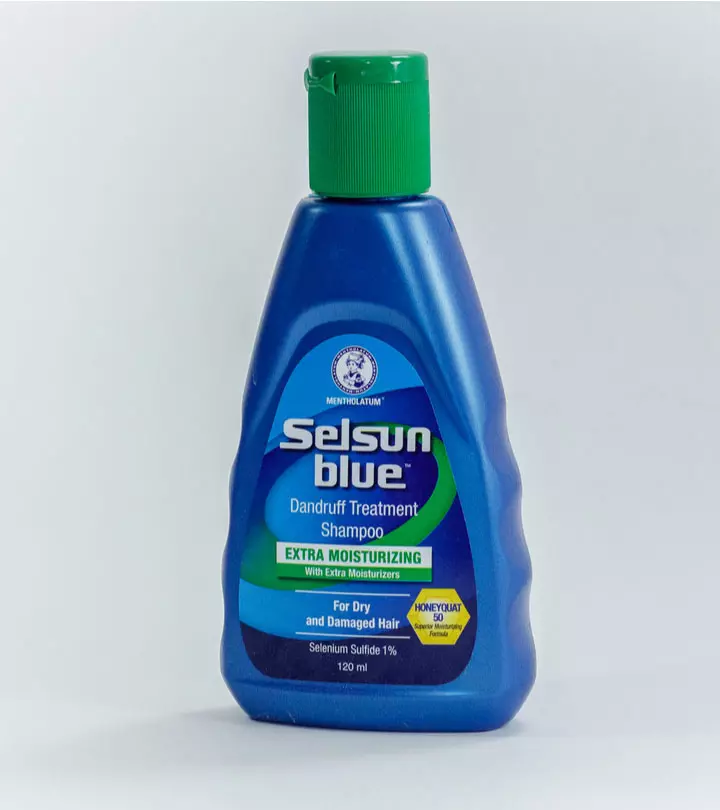
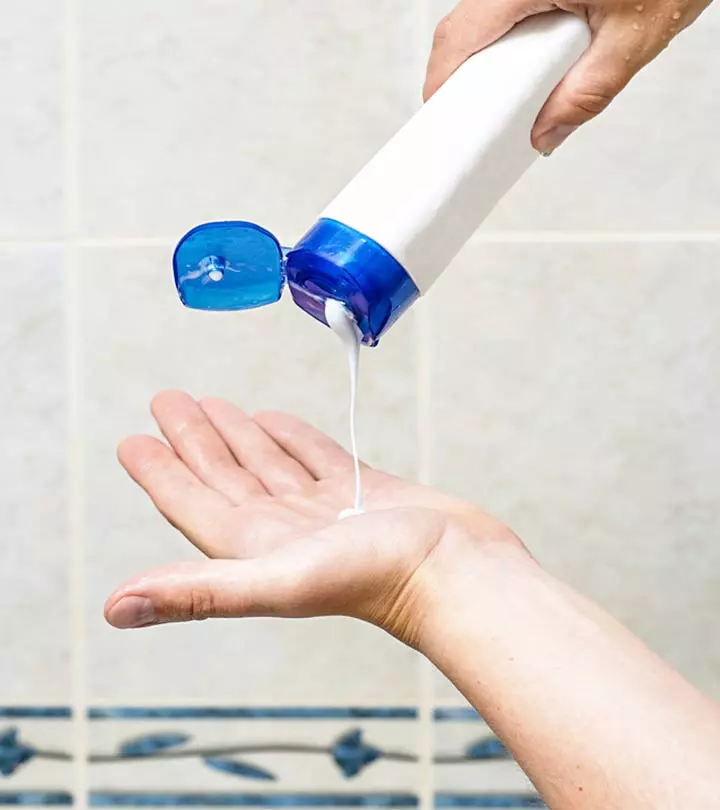
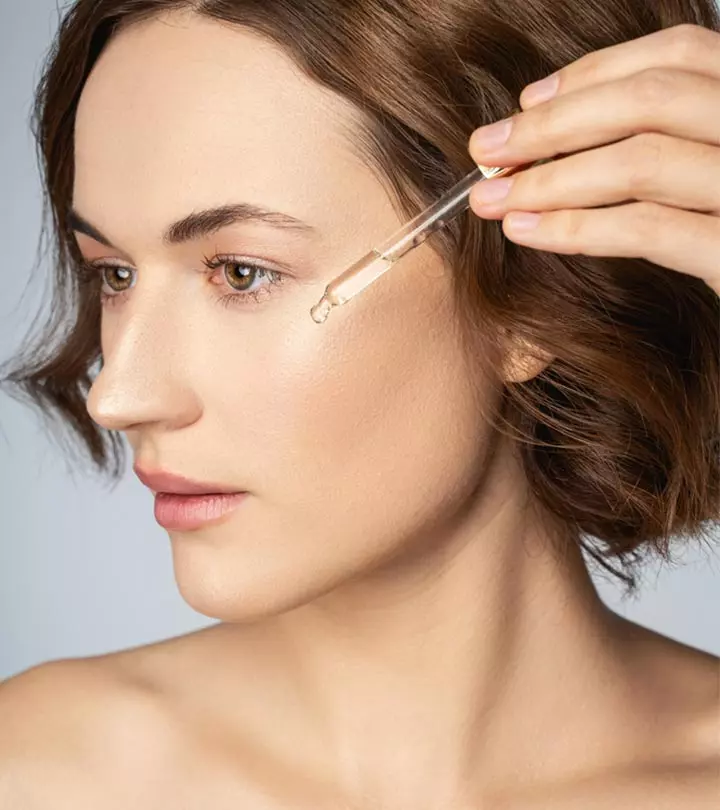







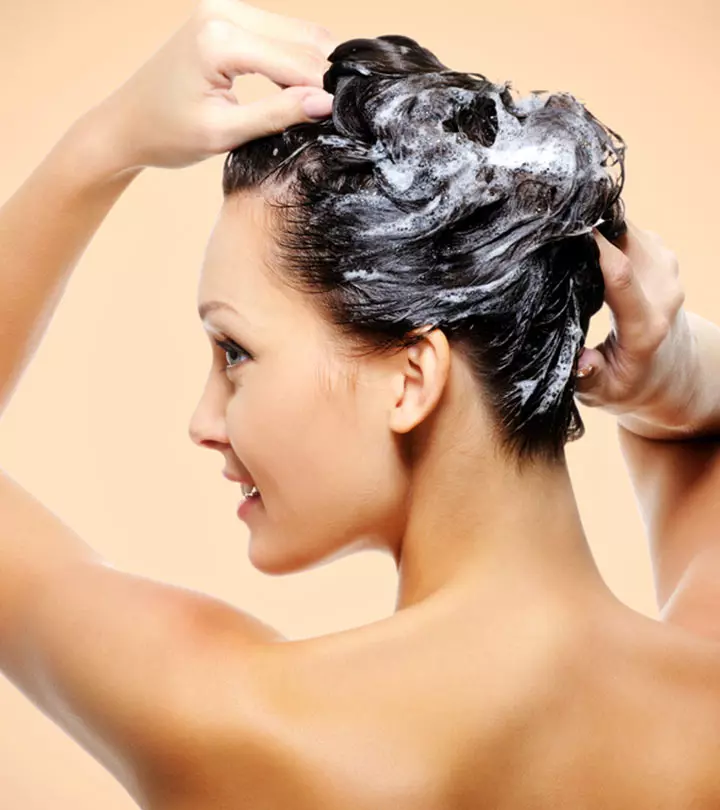


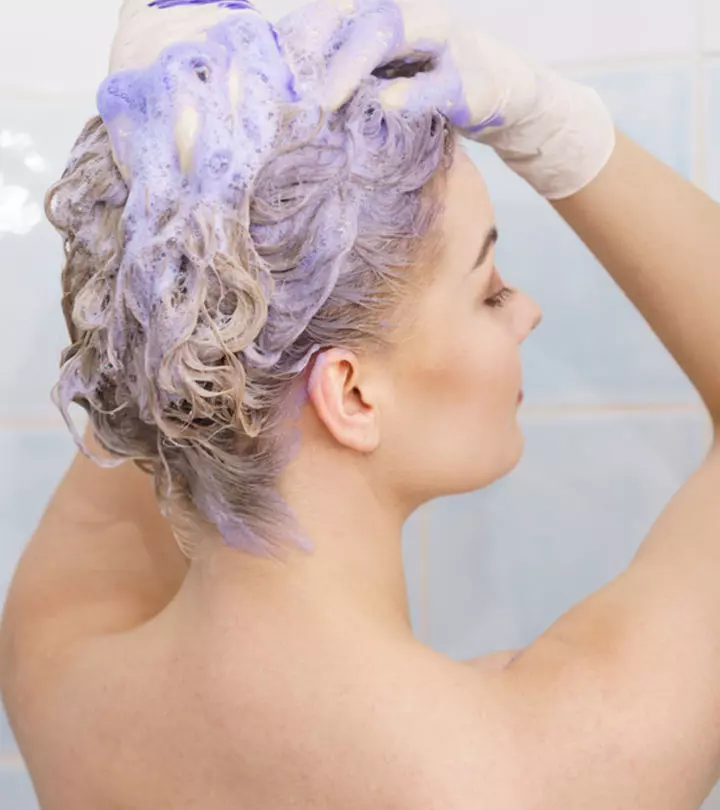

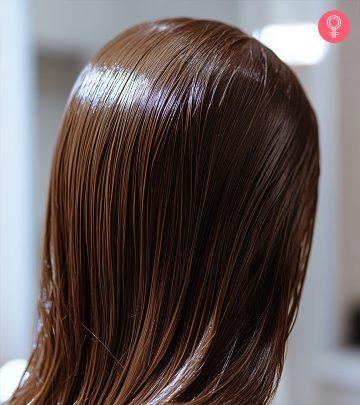


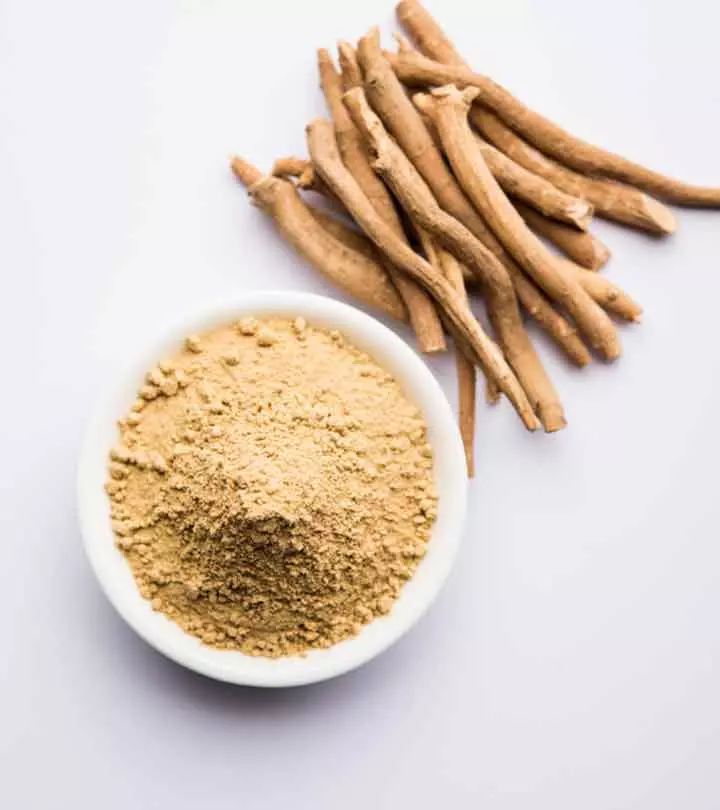

Community Experiences
Join the conversation and become a part of our empowering community! Share your stories, experiences, and insights to connect with other beauty, lifestyle, and health enthusiasts.